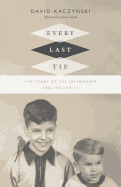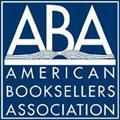 Booksellers gathered yesterday morning for the American Booksellers Association's town hall meeting, marking the second consecutive year that the ABA has held a town hall meeting at WI in addition to the usual meeting at BookExpo America. The discussion ranged from best practices when working with self-published authors to race and class diversity initiatives, raising awareness about the negative effects of Amazon.com and much more.
Booksellers gathered yesterday morning for the American Booksellers Association's town hall meeting, marking the second consecutive year that the ABA has held a town hall meeting at WI in addition to the usual meeting at BookExpo America. The discussion ranged from best practices when working with self-published authors to race and class diversity initiatives, raising awareness about the negative effects of Amazon.com and much more.
The meeting's first topic was the ABA's recent experiments in selling books directly through the IndieBound platform. Christin Evans, co-owner of the Booksmith in San Francisco, Calif., and Kepler's in Menlo Park, stated that by selling books directly, the ABA is competing with its own member stores, and perhaps those resources could be put to better use elsewhere. Robert Sindelar, v-p of the ABA board and managing partner of Third Place Books in Lake Forest Park and Ravenna, Wash., stressed that selling through IndieBound is part of a six-month experiment in improving the extremely low conversion rates on that platform. Pete Mulvihill, board member and co-owner of Green Apple Books in San Francisco, also stressed that experimenting with IndieBound was "in no way" a distraction from improving IndieCommerce, and Matt Norcross, board member and co-owner of McLean and Eakin Booksellers in Petoskey, Mich., added that anything learned from this experiment would go toward helping all of the membership.
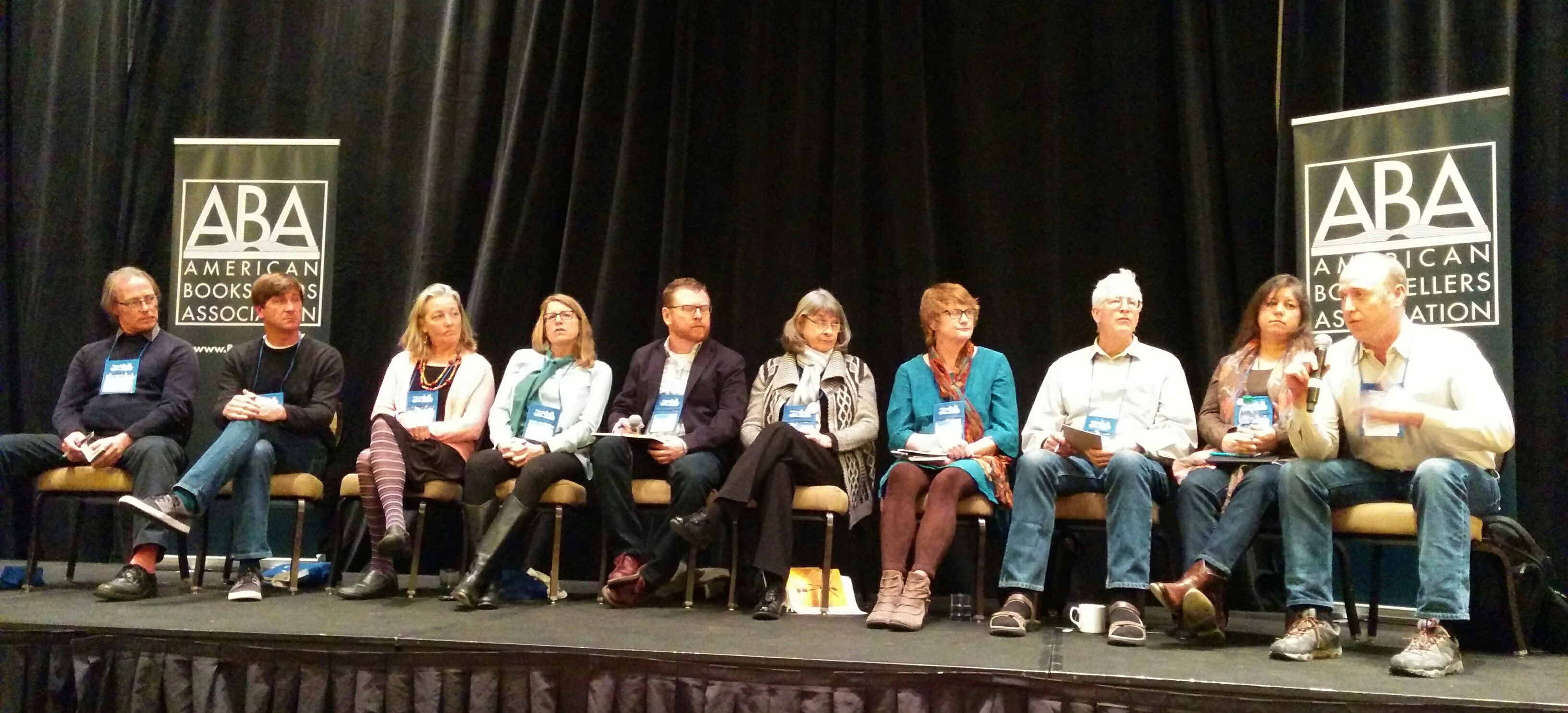 Many booksellers who participated in the town hall meeting, as well as many of the ABA board members themselves, frequently mentioned the Civic Economics study presented at WI earlier in the morning about the damage done to local, regional and national economies by Amazon.com (details in the story above). Betsy Burton, president of the ABA board and co-owner of the King's English Bookshop in Salt Lake City, Utah, said the study was an excellent tool not only to share with customers but to take to city and town councils, mayors and even state governors and legislature. ABA CEO Oren Teicher said that the entire presentation, as well as a PDF of the study, will be available for all ABA members on the association's website.
Many booksellers who participated in the town hall meeting, as well as many of the ABA board members themselves, frequently mentioned the Civic Economics study presented at WI earlier in the morning about the damage done to local, regional and national economies by Amazon.com (details in the story above). Betsy Burton, president of the ABA board and co-owner of the King's English Bookshop in Salt Lake City, Utah, said the study was an excellent tool not only to share with customers but to take to city and town councils, mayors and even state governors and legislature. ABA CEO Oren Teicher said that the entire presentation, as well as a PDF of the study, will be available for all ABA members on the association's website.
On the topic of self-published authors and the best ways to work with them, Jonathon Welch, board member and owner of Talking Leaves Books in Buffalo, N.Y., hoped that the ABA could establish a set of best practices and urged booksellers to see them as more than just a nuisance.
Paul Yamazaki, head buyer at City Lights Bookstore in San Francisco, raised the topic of creating an ongoing initiative to address the issues of race and class within the entire book business, and wondered if the ABA could partner with the American Association of University Publishers or the Association of American Publishers in addressing these things. Burton answered that diversity was a major issue at recent town hall meetings, and since then, the board has changed a number of policies in attempt to address the problem. One of those is a renewed emphasis on diversity scholarships, as well as changes to the board nomination process. The ABA board has also reached out to the AAP and AAUP and discussions are ongoing, but progress has been gradual. Burton said that though it is a difficult problem, it is a frequent point of discussion among board members.
Lacy Simons, owner of hello hello books in Rockland, Maine, wondered if there were any efforts being made to add used books functionality to IndieCommerce. Sindelar acknowledged that it was indeed part of the conversation, and in fact "comes up every time" there is any sort of IndieCommerce task force, but did not have concrete details. Mulvihill said that some 60% of his store sales are used books, but they were not in his store's own system, or in any system. He said he would love to get his used books online in an affordable way, but cautioned that online used books sales are a race to the bottom in terms of pricing.
Also raised was the issue of credit card fees and increases in cost, and whether that could warrant any antitrust scrutiny from the Department of Justice. Burton acknowledged that independent booksellers are not the only ones aware of the problem, and that booksellers together with other business organizations could have a "considerable amount of clout" in getting something done about it.
The question of whether the ABA could help encourage or recruit prospective booksellers in underserved markets around the United States was raised by Michael Herrmann, owner of Gibson's Bookstore in Concord, N.H. John Evans, board member and co-owner of DIESEL, a bookstore in Oakland, Larkspur and Brentwood, Calif., said the board has had ongoing conversations about this for the past few years. The resurgence of indie bookstores in the U.S., he said, is not keeping pace with the need for bookstores around the country. Evans said that it is easier for established stores to open second or third locations than for a brand new store to find funding. Betsy Burton suggested that the Civic Economics Amazon study could help show banks how valuable independent bookstores are for local economies, and Pete Mulvihill noted that the big five publishers seem to be as enthusiastic about new bookstores as many booksellers. Said Evans: "Personally I would love to see bookstores opening up like mushrooms across the landscape." --Alex Mutter
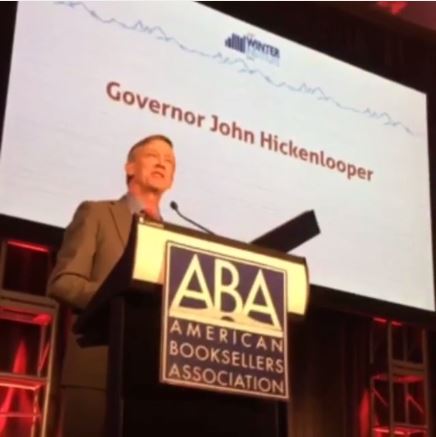
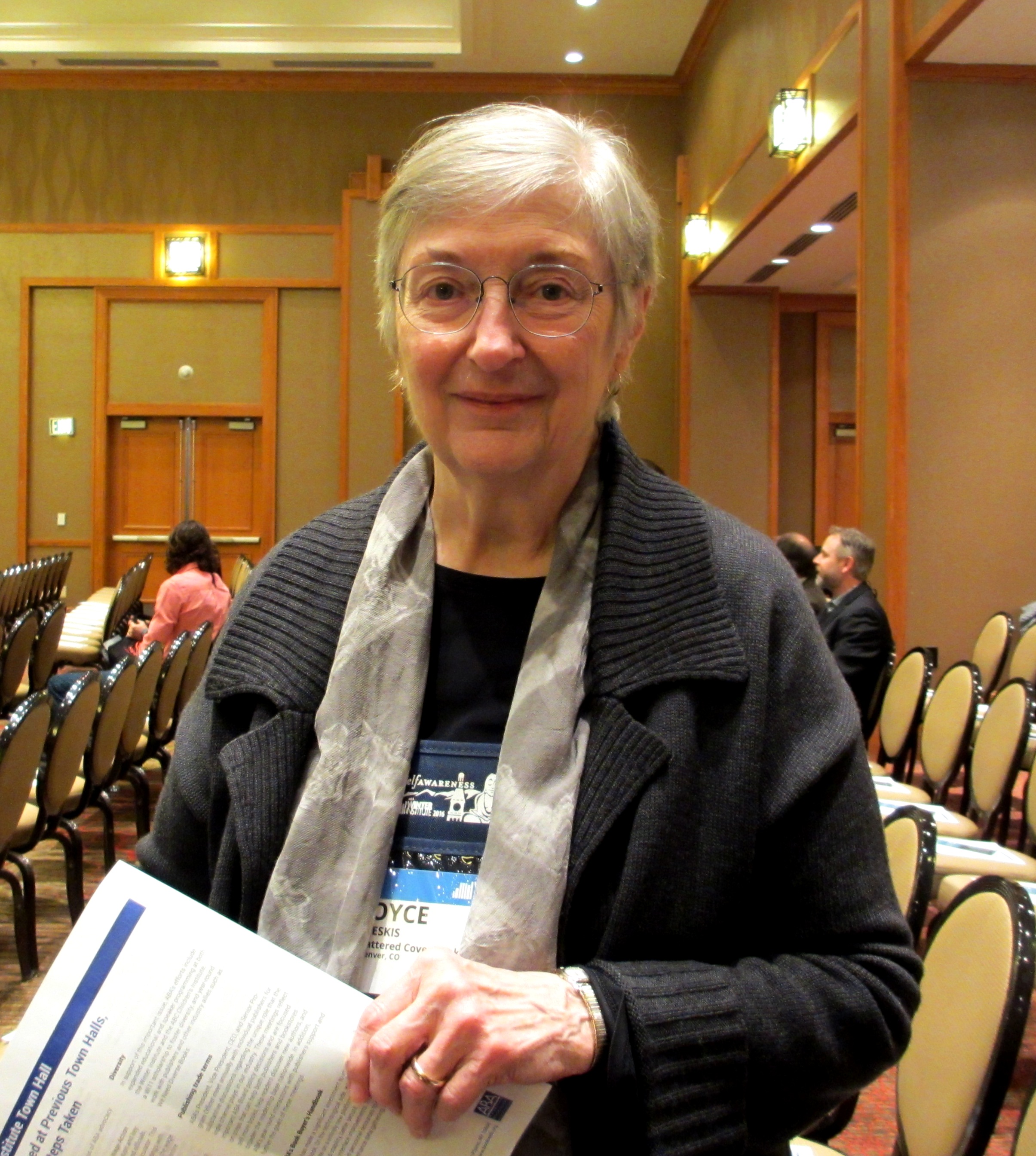
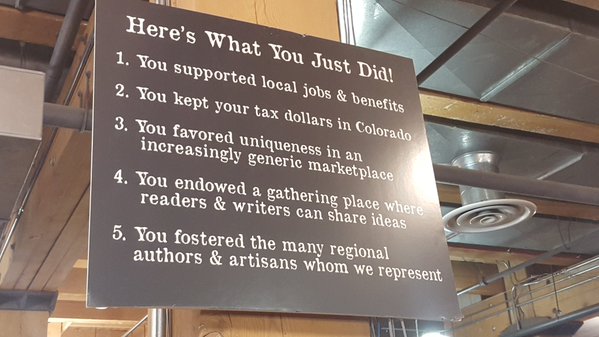 He remembered, too, that "Joyce said several times that day that 'the more books that are in more people's hands the better the world will be.' " He continued: "She inspired whole generations of book lovers and helped make Denver into a city of readers. She was also a crusader for freedom of speech and the right of free access to information." As Governor Hickenlooper left, he said approvingly to the crowd: "This room is filled with Joyce Meskises."
He remembered, too, that "Joyce said several times that day that 'the more books that are in more people's hands the better the world will be.' " He continued: "She inspired whole generations of book lovers and helped make Denver into a city of readers. She was also a crusader for freedom of speech and the right of free access to information." As Governor Hickenlooper left, he said approvingly to the crowd: "This room is filled with Joyce Meskises."


SHELFAWARENESS.1222.S1.BESTADSWEBINAR.gif)


SHELFAWARENESS.1222.T1.BESTADSWEBINAR.gif)
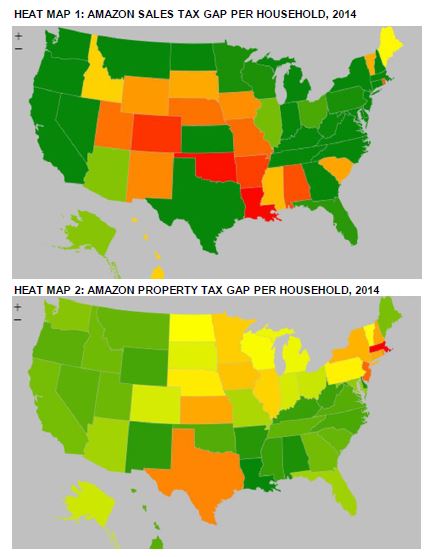 In 2014, Amazon's warehouses--65 million square feet of space--employed roughly 30,000 full-time workers and 104,000 part-time and seasonal workers. But including all the jobs lost from stores whose sales Amazon supplanted, Amazon sales "produced a net loss of 135,973 retail jobs."
In 2014, Amazon's warehouses--65 million square feet of space--employed roughly 30,000 full-time workers and 104,000 part-time and seasonal workers. But including all the jobs lost from stores whose sales Amazon supplanted, Amazon sales "produced a net loss of 135,973 retail jobs." Booksellers gathered yesterday morning for the American Booksellers Association's town hall meeting, marking the second consecutive year that the ABA has held a town hall meeting at WI in addition to the usual meeting at BookExpo America. The discussion ranged from best practices when working with self-published authors to race and class diversity initiatives, raising awareness about the negative effects of
Booksellers gathered yesterday morning for the American Booksellers Association's town hall meeting, marking the second consecutive year that the ABA has held a town hall meeting at WI in addition to the usual meeting at BookExpo America. The discussion ranged from best practices when working with self-published authors to race and class diversity initiatives, raising awareness about the negative effects of  Many booksellers who participated in the town hall meeting, as well as many of the ABA board members themselves, frequently mentioned the
Many booksellers who participated in the town hall meeting, as well as many of the ABA board members themselves, frequently mentioned the 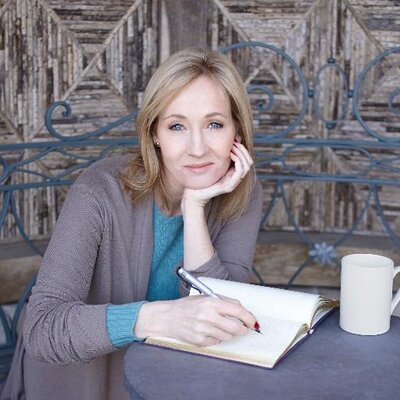
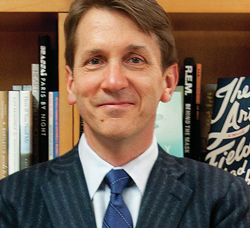
 Amazon is
Amazon is 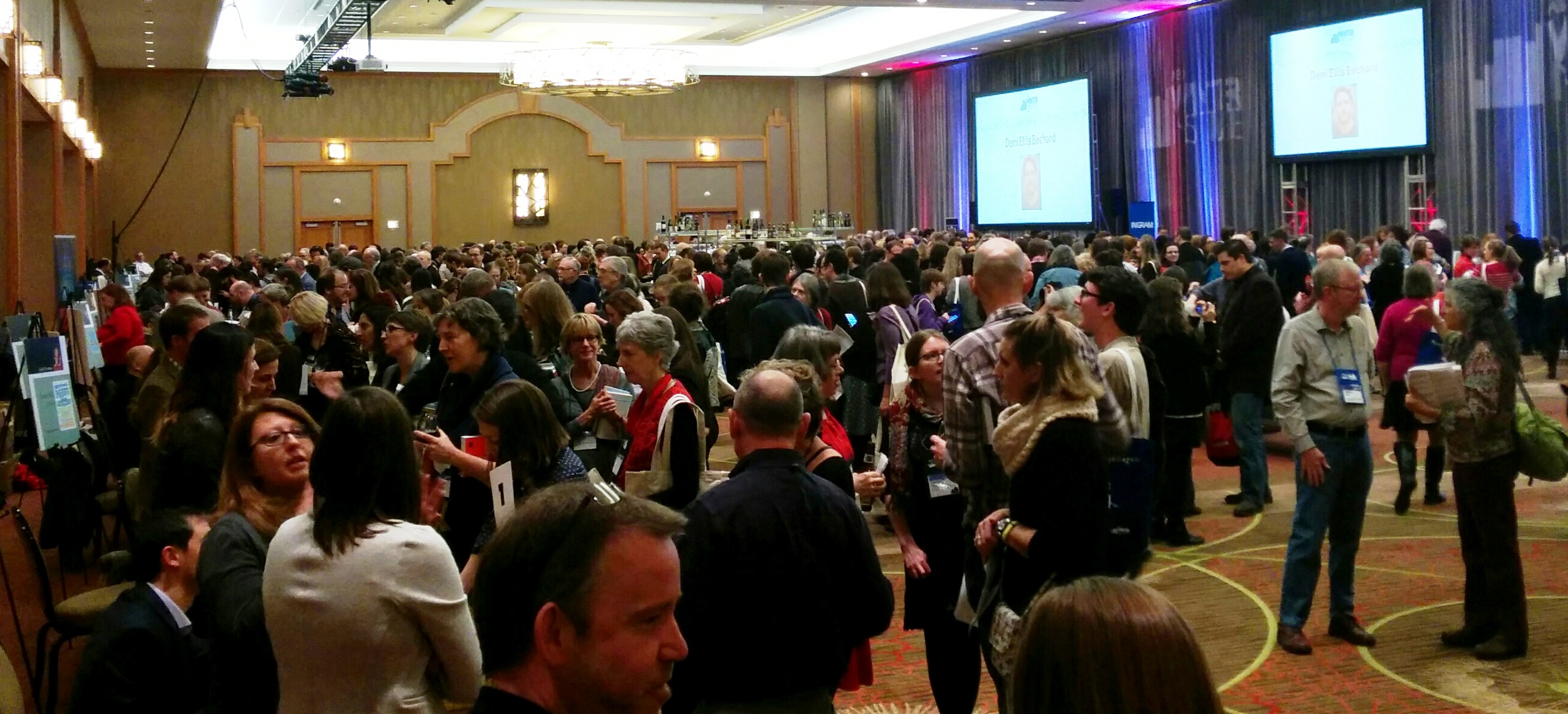 Last night, many hundreds of booksellers crowded Winter Institute 11's author reception, a highlight of an event full of highlights. There attendees met and received signed galleys from some 70 authors, including Richard Russo, Mark Kurlansky, Kwame Alexander and two author/booksellers: Louise Erdrich and Len Vlahos.
Last night, many hundreds of booksellers crowded Winter Institute 11's author reception, a highlight of an event full of highlights. There attendees met and received signed galleys from some 70 authors, including Richard Russo, Mark Kurlansky, Kwame Alexander and two author/booksellers: Louise Erdrich and Len Vlahos.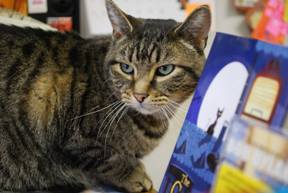 Posted yesterday on Facebook by
Posted yesterday on Facebook by 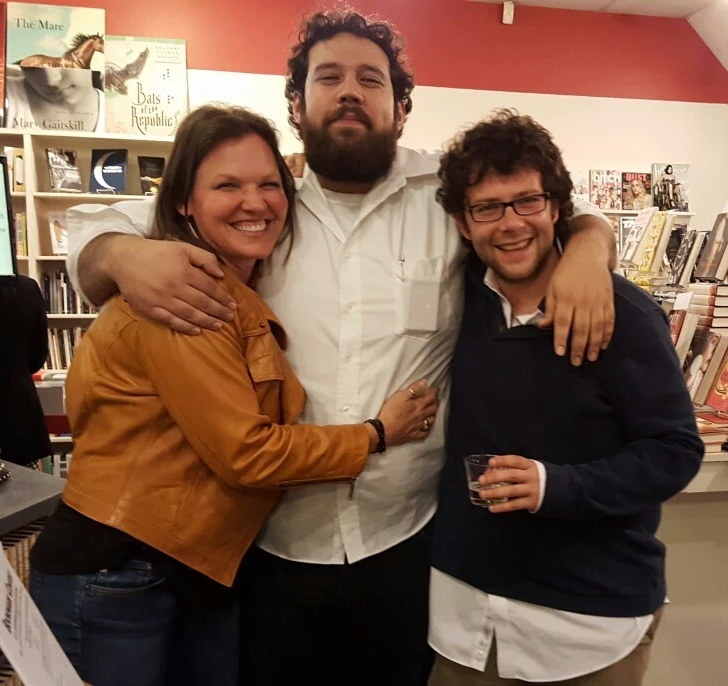
 HBO's hit series
HBO's hit series 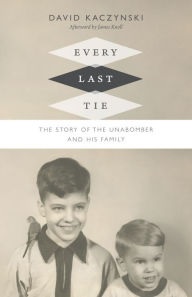 David Kaczynski is a poet, a former English teacher, an impassioned opponent of the death penalty and the younger brother of Ted Kaczynski, better known to the world as the Unabomber. In Every Last Tie, he contemplates "loving memories and painful outcomes," hoping to illuminate his brother's and his own experiences.
David Kaczynski is a poet, a former English teacher, an impassioned opponent of the death penalty and the younger brother of Ted Kaczynski, better known to the world as the Unabomber. In Every Last Tie, he contemplates "loving memories and painful outcomes," hoping to illuminate his brother's and his own experiences. 